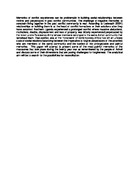| dc.description.abstract | Memories of conflict experiences can be problematic in building social relationships between victims and perpetrators in post conflict communities. The challenge of negative memories to constrain living together in the post conflict community is real. According to Lederach (2004) relationships or building them is at the heart of conflict formations or their solutions after they have occurred. Northern Uganda experienced a prolonged conflict where massive abductions, mutilations, deaths, displacement and loss of property was bitterly experienced perpetuated by the rebel Lord’s Resistance Army whose members belonged to the same Acholi community that terrorised them. That conflict, one of the “new wars” of contemporary Africa has left an uneasy state of social relations balancing between the imperative to forgive perpetrators of the atrocities who are members of the same community and the burden of the unforgettable and painful memories. This paper will attempt to present some of the most painful memories of the massacres that took place during the twenty year war as remembered by the people of Acholi and discuss some of their dimensions that are posing challenges for forgiveness. The analytical aim will be to search for the possibilities for reconciliation. | en_US |


